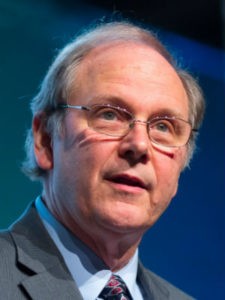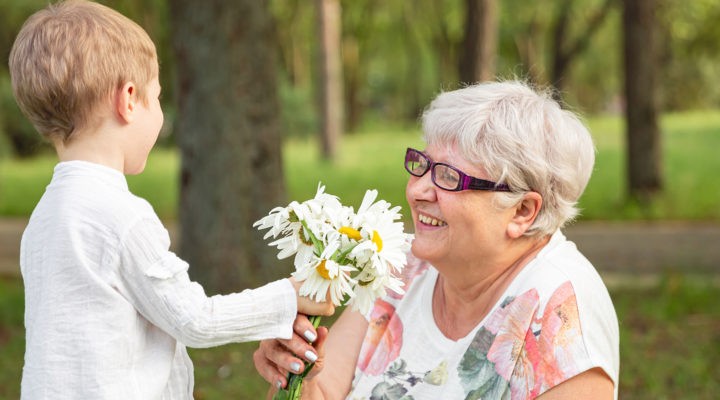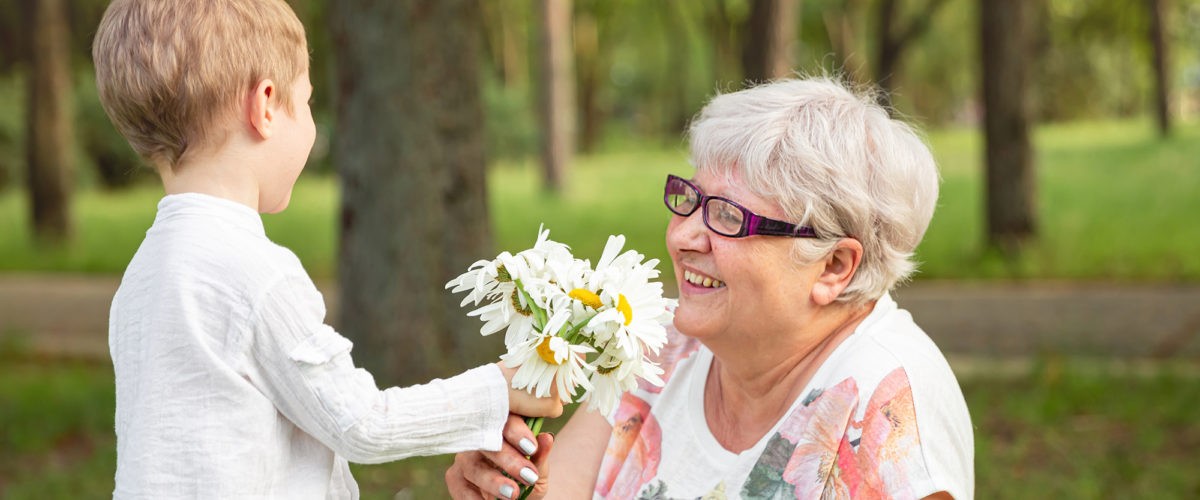Yesterday on my way home, I went to the supermarket to pick up a few things. Arriving at the door at the same time as a young mother and child coming from a different part of the parking lot, I was surprised when she paused, smiling, and motioned for me to enter first.
Several minutes into my shopping list, not finding a product after a frustrating search, I asked for information from an employee stocking produce. Even though he was busy, he left his workspace and walked me past several aisles to show me the exact spot where it was tucked away on a bottom shelf.

Robert Sellers
Then later, as I approached a crowded check-out line, someone already in line saw that I only had a few items in my basket and stepped back, indicating that I should move in ahead of her and a full cart.
I suppose you also have experienced these sorts of unpretentious kindnesses. They constitute everyday civility, neighborly actions that we might all associate with a less rushed and more polite period in our nation’s history — or with how our mothers taught us to behave.
The Golden Rule
But they also illustrate the Golden Rule, a version of which was given by Jesus in the Sermon on the Mount: “In everything do to others as you would have them do to you; for this is the law and the prophets” (Matthew 7:12).
Methodist New Testament professor at Asbury Theological Seminary, Ben Witherington, comments on this principle:
Jesus was by no means the first or only person to come up with a version of the Golden Rule. There is the famous saying of Rabbi Hillel (110 BCE-10 CE), for example: “What is hateful to you, do not do to your neighbor; that is the whole Torah, while the rest is commentary on it; go and learn.”… It is worth pointing out that Jesus insists on a positive formulation of the maxim, whereas other forms of it, both Jewish and Greco-Roman … tend to be negative. Jesus is not talking just about avoiding evil or (the) appearance of evil. He is talking about actually doing good to others.
Indeed, this advice is a common maxim found in most religions and cultures. The principle for treating others as we would like to be treated is reflected in the wisdom of ancient Egypt, India, Greece, Rome and Persia — as well as taught in the major world religions and philosophies of Judaism, Christianity, Islam, Hinduism, Buddhism, Jainism, Sikhism, Confucianism, Daoism, Zoroastrianism, Baha’i, Humanism and Existentialism.
So ubiquitous and influential is this moral tenet that it was cited in the famous document “Declaration Toward a Global Ethic,” initially written by Catholic theologian Hans Küng and ratified in 1993 and later updated in 2018 by the Parliament of the World’s Religions.
Self-serving kindness
Yet, there is an element of selfishness implicit in the Golden Rule, for acting positively toward others may inspire positive behaviors toward oneself. Concerning the human tendency to act according to one’s own self-interest, Jesus was not naïve, notes Witherington: “Jesus assumes self-interest and self-regard and seeks to stretch the audience toward self-sacrifice and regard and love for others.”
“There is an element of selfishness implicit in the Golden Rule, for acting positively toward others may inspire positive behaviors toward oneself.”
Courteous manners, such as the ordinary ones cited earlier, often are encountered in our friendly Southern culture. Sadly, however, sometimes the motivation for such behavior — other than training and habit — may actually resonate more with the proverb, “Honey catches more flies than vinegar,” which teaches that it is “easier to get what you want by being polite rather than by being rude and insolent.”
Honoring others
But the aim of the Golden Rule is not the personal gain one might get in return for being kind to another. Instead, the instruction stresses how one must behave toward others in an actual situation and not what one might receive in an imagined one. The principle is about the way to honor and value another, regardless of whether there is a reciprocal benefit to oneself.
Understanding the rule in this way makes it clearly consistent with a teaching of the Apostle Paul. In his letter to the church at Philippi, he admonished: “Do nothing from selfish ambition or conceit, but in humility regard others as better than yourselves. Let each of you look not to your own interests, but to the interests of others” (Philippines 2:3-4).
The first 11 verses of chapter 2 concern our imitating the humility of Christ, as commemorated in the Christological hymn recited in verses 6-11. Richard Hays, professor emeritus of New Testament at Duke Divinity School, comments on this Philippian passage:
Christ’s obedience to the point of death (2:8) is offered to the Philippians as a pattern for their own obedience (2:12). Just as he obediently suffered, so the Philippians should stand firm in the gospel, even when it requires them to suffer (1:27-30). Just as he humbled himself … and took the form of a slave, so the Philippians should in humility … become servants of the interests of others. Thus, Paul takes a hymn whose original purpose is doxological and employs it in service of moral exhortation. Christ becomes an “exemplar” who illuminates the way of obedience.
The apostle is clear: “Let the same mind be in you that was in Christ Jesus” (Philippians 2:5). In the same way that Christ was self-emptying in his humility and sacrifice for others, the followers of Jesus also must humbly and voluntarily serve the interests of both friends and strangers.
Living the Golden Rule in a pandemic
So, how do these two admonitions, one from Jesus and the other from Paul, relate to the current conflicts during the pandemic in America over getting vaccinations or wearing masks?
“I am constantly amazed that people who claim to be Christians refuse to get a COVID vaccine or wear masks in public.”
I am constantly amazed that people who claim to be Christians refuse to get a COVID vaccine or wear masks in public.
Given the frightening rise of infections and serious illness due to the spread of the Delta variant — and reports that almost all pandemic deaths are of the unvaccinated — it is self-evident that the Golden Rule is relevant. One should want to protect others by getting a vaccine, just as he or she would want to be protected from catching the virus from them. This conclusion is valid regardless of the religious or philosophical tradition one follows. No one really wants to get sick and risk hospitalization and death.
Even more to the point, however, is the instruction of the apostle. Anyone — especially a Christ-follower — must humbly regard the well-being of others more than his or her own welfare. Doing so implies that wearing a mask, whose purpose always has been explained as providing protection for the persons who are nearby, is an obvious way that a clear New Testament teaching can be applied to a contemporary ethical problem.
Yet, many Americans — even Christians — are claiming their personal freedoms trump any responsibility to do something that they don’t wish to do. “As an American,” they argue, “I am free to do as I please.”
That’s not true, others will insist, citing a familiar exception: “You are not free to yell ‘fire’ in a crowded theater.”
But this retort, it appears to me, does not really correspond to our dilemma today. Not wearing a mask or getting a vaccine on the basis of personal freedom is not like yelling “fire” in a crowded theater. That scenario envisions someone creating a dangerous situation for others based upon a fiction.
“You are not free to know that there is a fire in a crowded theater but not yell ‘fire’ and thus secretly escape to safety without warning others.”
Another line of reasoning seems more pertinent: “You are not free to know that there is a fire in a crowded theater but not yell ‘fire’ and thus secretly escape to safety without warning others.” This hypothetical case imagines one endangering others in the midst of an actual life-threatening situation. Not to get a vaccine or wear a mask, as the pandemic spreads, is literally threatening the wellness, perhaps even the very lives, of those persons around you as you argue that you are simply exercising personal freedoms and choices.
The disagreements over vaccines and masks actually concern health and safety and are not merely differences of political opinion or matters of individual liberty. These disputes between Centers for Disease Control supporters and anti-vax and anti-mask “patriots” are shattering friendships and splitting families in our terribly divided America.
Good citizens and faithful Christ followers
In 2015, during an Ebola outbreak in West Africa that was threatening our own country, as well, the then little-known director of the National Institute of Allergies and Infectious Diseases, Anthony Fauci, was interviewed by The Atlantic. As the article relates Fauci
raised the idea of personal freedom, which is really at the core of objections to vaccine requirements. Of course, [children] cannot [always] be vaccinated [at their young age], leaving them susceptible to anything, so choosing not to vaccinate is no more a matter of personal freedom than choosing to drive drunk or practice blindfolded archery in a crowded elevator … . The central question is how to get people to care about infectious disease beyond one’s own near-term likelihood of contracting something.
Now, six years after Fauci’s expressed uncertainty about how to get Americans genuinely committed to the measures needed to protect their fellow citizens, even their own family members, we are experiencing the very same conundrum. Yet, for Christians, the decision is not just whether or not to be good citizens. It is also about whether to be faithful Christ-followers.
To paraphrase my North Carolina friend, Dennis Foust, who put it so practically and profoundly in his St. John’s sermon recently: “Obey Jesus. Love your neighbor. Get the vaccine, and wear a mask!”
Rob Sellers is professor of theology and missions emeritus at Hardin-Simmons University’s Logsdon Seminary in Abilene, Texas. He is a past chair of the board of the Parliament of the World’s Religions in Chicago. He and his wife, Janie, served a quarter century as missionary teachers in Indonesia. They live in Waco, Texas.
Related articles:
In America’s culture divide, the Golden Rule is no longer enough | Opinion by Mark Wingfield
Have you heard the one about empathy being a sin?
Loving your global neighbor | Opinion by Knox Thames


